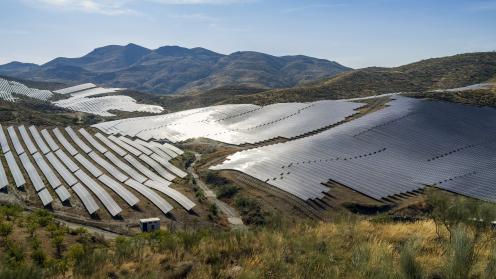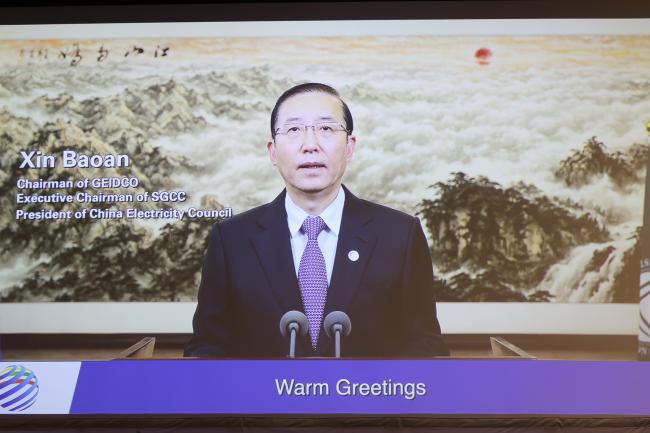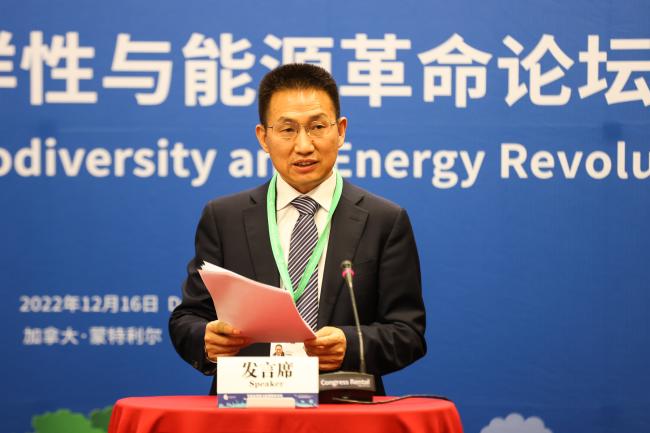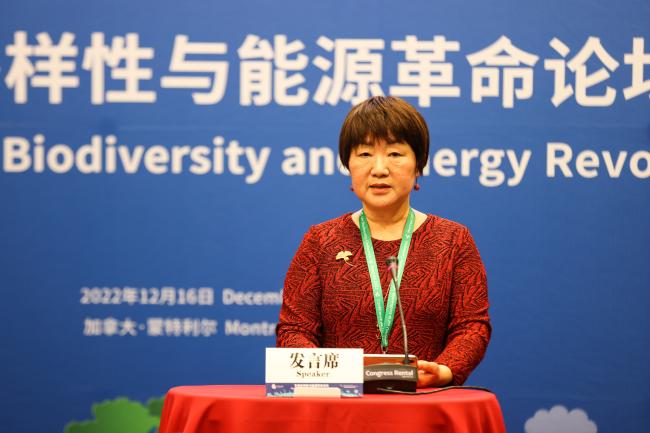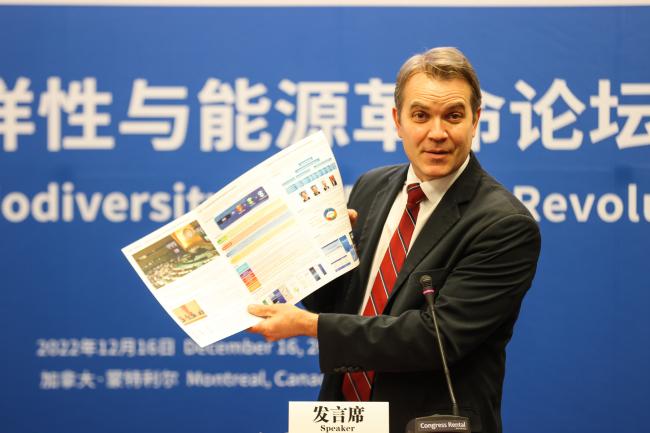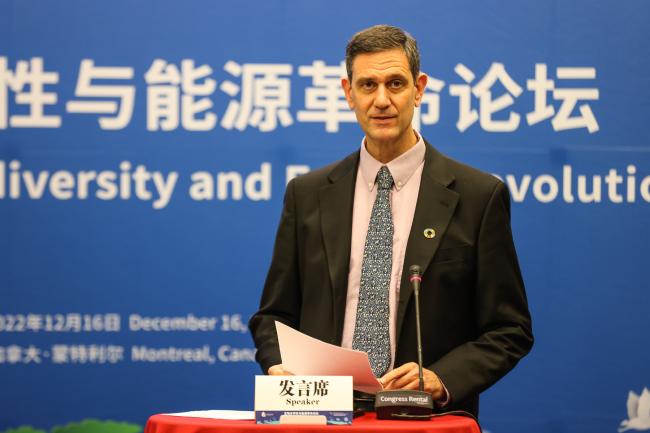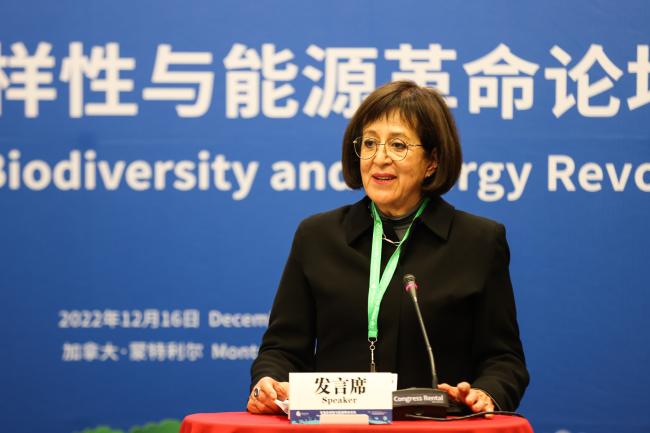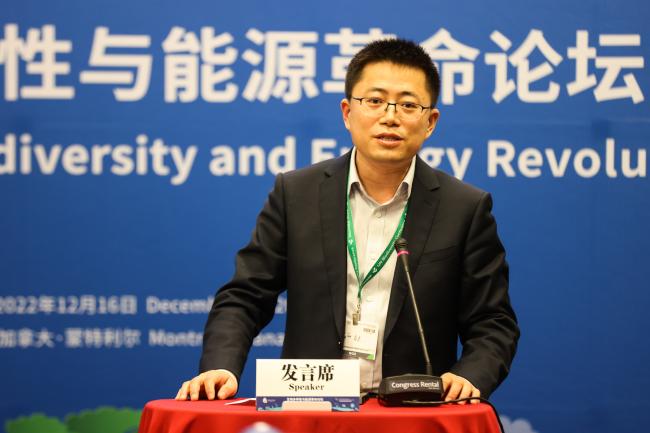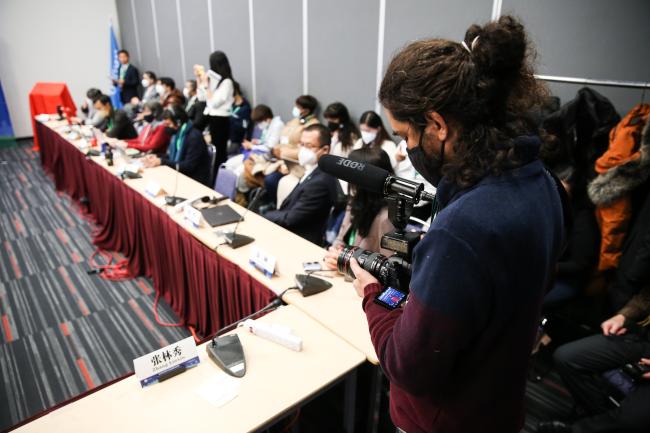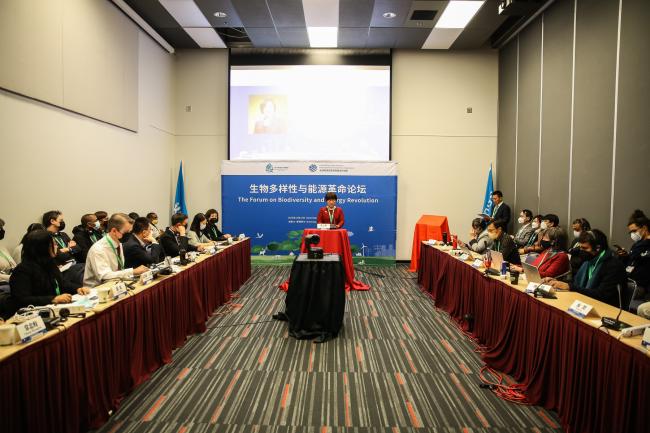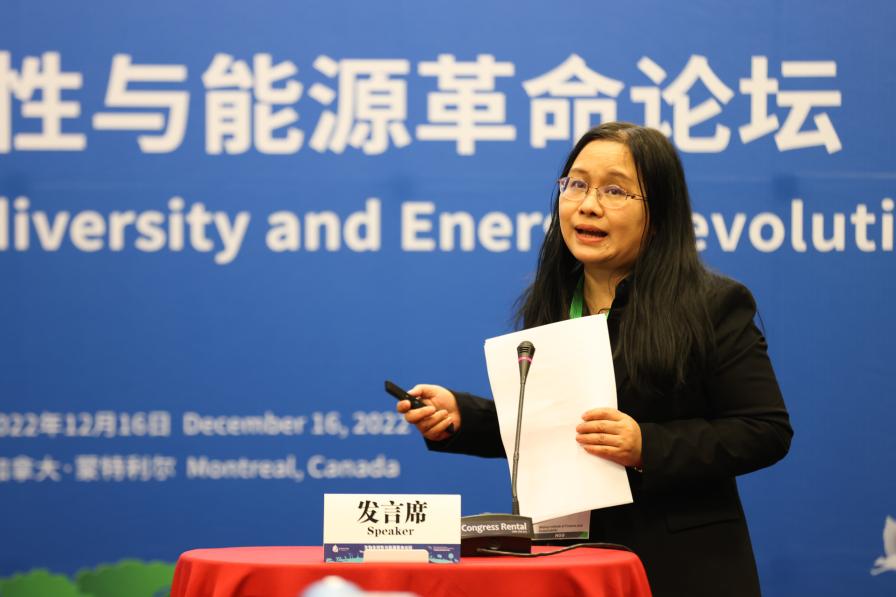About
Releasing the results of a book on Biodiversity and Revolution of Energy and Electric Power, this forum addressed the unsustainable, fossil fuel-dominated pattern of energy development as a major underlying issue and contributor to the biodiversity crisis.
The Global Energy Interconnection Development and Cooperation Organization (GEIDCO) convened a forum on Biodiversity and Energy Revolution to explore solutions to advance biodiversity conservation from the perspective of energy. The event was held during the second part of the 15th meeting of the Conference of the Parties ( COP15) to the UN Convention on Biological Diversity (CBD) in Montreal, Canada. GEIDCO’s debut book, which was launched during the event, on Biodiversity and Revolution of Energy and Electric Power proposes new ideas and plans for the coordinated governance of biodiversity and energy. This event has key significance for further promoting biodiversity around the world, fostering a community of all life on Earth, and creating a better future in which man and nature coexist in harmony. This forum also addressed the unsustainable, fossil fuel-dominated pattern of energy development as a major underlying issue and contributor to the biodiversity crisis. New ideas and approaches for advancing the energy and electric power revolution and securing biodiversity via Global Energy Interconnection (GEI) development were proposed.
Xin Bao’an, GEIDCO Chairman, Executive Chairman of the State Grid Corporation of China, and President of the China Electricity Council, remarked that, since the industrial revolution, mankind has created massive material wealth, but this it has come at a cost of ecological crises as manifested in biodiversity loss and environmental damage. He said the fossil fuel dominated energy mix, a main contributor to climate change, environmental pollution, and habitat degradation, further aggravates global biodiversity loss. He emphasised the need to focus on energy, the linchpin of the problem, to advance world energy revolution, transform energy development, and promote biodiversity through an accelerated shift to green and low-carbon energy.
Xin Bao’an explained that GEI is an interconnected modern energy system dominated by clean energy and centering on electricity, which represents the direction of world energy revolution. He said GEI can help address climate change, curb environmental pollution, reduce habitat loss, and facilitate the sustainable use of biological resources, thus accelerating ecological restoration. Dedicated to advancing sustainable development of humanity, he said GEIDCO has: built a global cooperation platform, facilitated clean energy projects, conducted in-depth research in energy, climate and environment, and released more than 80 innovative research findings. GEIDCO, he explained, researched and proposed a holistic scheme to promote biodiversity conservation via GEI, which was highly appraised by the UN and other relevant parties, and was included in the Policy Briefs of the 2022 UN High-level Political Forum on Sustainable Development in July 2022. The scheme, he said, injects new momentum and offers a new paradigm for biodiversity conservation.
Chen Gesong, Global Energy Interconnection Development and Cooperation Organization (GEIDCO), moderated the event. Cui Shuhong, Ministry of Ecology and Environment, China, spoke on Chinese President Xi Jinping’s 2015 proposal for GEI. He cited GEIDCO as a world leader in research on energy and biodiversity conservation and governance.
Elizabeth Maruma Mrema, Executive Secretary, Convention on Biological Diversity (CBD), via video, recalled the Kunming Declaration adopted during the Kunming phase of the 15th meeting of the Conference of the Parties to the Convention on Biological Diversity (CBD COP 15) toward building a global ecological civilization. She stressed energy transition as the linchpin for tackling biodiversity loss and climate change. She lauded GEIDCO’s efforts towards facilitating a green and low-carbon energy transition to achieve the post-2020 global biodiversity framework (GBF).
Linxiu Zhang, Director, UN Environment Programme-International Ecosystem Management Partnership (UNEP-IEMP), cited the UN General Assembly’s 2022 Resolution on the human right to a clean, healthy and sustainable environment and stressed improved finance for biogas and a biomass-based economy and multistakeholder platforms for increasing awareness, knowledge, and capacity for the energy revolution for biodiversity. She lauded GEIDCO’s practical plan for energy revolution and governance.
The report, Biodiversity and Revolution of Energy and Electric Power, was officially launched, with Xin urging other countries to use it for reference. Chen detailed the report, highlighting the globally interconnected clean energy-dominant and electric-centric GEI system for green, low-carbon sustainable development through smart grids, ultra-high voltage (UHV) grids, and clean energy. He called GEI the best solution for an energy revolution, as it: accelerates energy efficiency and energy system decarbonization; reduces environmental pollution and habitat loss; promotessustainable utilization of bio-resources; and advances ecological restoration. He said GEI promotes biodiversity conservation through, among others: climate governance; sustainable utilization of bioresources and ecological restoration; and emergency protection. He noted that GEI uses clean energy power generation and distribution, electrosynthesis, and accelerated technical innovation in carbon capture, utilization, and storage.
A second panel was moderated by Georgina Izquierdo Montalvo, Director General, National Institute of Electricity and Clean Energies, Mexico. Diane Holdorf, World Business Council for Sustainable Development (WBCSD), stressed “huge” business opportunities in affordable, secure and clean energy. She described WBCSD’s Nature-positive Guidelines, setting targets for investment plans and reporting on nature actions across three key global value chains, including energy systems.
Chang Zhongjiao, State Grid Brazil Holding (SGBH), described SGBH’s biodiversity achievements, including a green-building stamp on its headquarters in Rio de Janeiro. He highlighted the Xingu Rio Transmission project, the largest clean energy transmission line in Brazil, with “vegetation suppression” techniques that preserve over 300 hectares of forest.
Francis Bradley, Electricity Canada, said Canada’s electrical grid has a “100% non-emitting” goal and follows international standards on environmental management and social responsibility. He noted biodiversity restoration projects, including: pollinator meadows for butterflies; native seeds for rehabilitating land; and a bird-beneficial management practices guide.
Hong Lan, Renmin University, described biodiversity risk management standards for financial institutions, stressing that biodiversity risk management turns risks into opportunities. She identified key measures including monitoring adverse impacts of energy projects on endangered birds of prey, stressing that “if all biodiversity can be framed as business, we can build wealth for a beautiful world.”
Craig Hanson, World Resources Institute, said: energy transition must happen everywhere; GEIDCO, NGOs, local communities, financial institutions, and policymakers must help drive it; and it must start now, including with every new energy installation.
Qin Hu, Environmental Defense Fund, China, highlighted that according to IEA, bioenergy needs to provide 20% of the world’s total energy demand by 2050 to achieve net-zero emissions but it needs produced and used sustainably. He announced progress on sustainable aviation fuel and noted that biofuel energy reduces methane emissions.
Tim Scott, UN Development Programme (UNDP), described UNDP’s support for 140 countries in strengthening their National Biodiversity Strategies and Action Plans and Nationally Determined Contributions NDC for addressing climate change. He described the potential of decentralized and solar battery mini grids that replace fossil fuels, calling for private sector investment to establish enabling environments.
Yuan Zhang, World Economic Forum (WEF), said GEI is a good platform for resetting humans’ relationship with nature as part of its economic agenda, including through transitions in government policies and social norms, and invited strengthened collaboration between WEF, GEIDCO, and all other partners.
Izquierdo Montalvo closed the meeting, noting that advancing the revolution in energy and electric power via GEI will help make Earth a more harmonious and beautiful home.
Organizers: GEIDCO
Contact: Frank Qiankun Wang qiankun-wang@geidco.org
For more information: https://www.cbd.int/side-events/4354
Written and edited by Tallash Kantai, Vijay Kolinjivadi, PhD, and Deborah Davenport, PhD.
All ENB photos are free to use with attribution. For this event, please use: Photo by IISD/ENB | Natalia Mroz
To receive free coverage of global environmental events delivered to your inbox, subscribe to the ENB Update newsletter.
